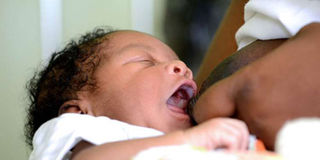Counties to build breast feeding zones, baby care centres

A mother breastfeeds her baby. All counties will be forced to build breast feeding and baby care centres in major towns to help working women attend to their children. AFP FILE PHOTO | JUNIOR D. KANNAH
What you need to know:
- The centres will also create jobs besides ensuring children don’t miss the nutritional value of a mother’s milk for at least six months as recommended by the World Health Organisation.
- Many mothers, they observed, have to stop breast feeding their children earlier than required so as to resume either formal or informal jobs, to fend for their families.
All counties will be forced to build breast feeding and baby care centres in major towns to help working women attend to their children.
The Senate Labour Committee chaired by Stewart Madzayo has supported a petition by two Kenyans seeking to ensure that — just like smoking zones — specific areas should be designated for breast feeding mothers.
The centres will also create jobs besides ensuring children don’t miss the nutritional value of a mother’s milk for at least six months as recommended by the World Health Organisation.
Many mothers, they observed, have to stop breast feeding their children earlier than required so as to resume either formal or informal jobs, to fend for their families.
APPROPRIATE POLICIES
Senate deputy minority leader Abdirahman Hassan (Wajir) and Martha Wangari (Nominated) said the Ministry of Health can put in place appropriate policies to actualise the proposal.
The committee members said they will engage the Council of Governors and the national government on the matter to safeguard the rights of women.
“The idea is super. We shall engage the governors and relevant government officials at the national level to ensure this works,” Ms Wangari said.
The committee will seek the Senate’s approval to start the process of coming up with a legislation that will go a long way in addressing challenges that women have been facing.
LEAVE WITHOUT NOTICE
Sometimes, house-helps leave without notice leaving mothers who have to go to work helpless, whereas others find it difficult to concentrate at work.
Mr Chrispinus Wekesa and Ms Grace Kerongo told the committee parents in Kenya experience challenges finding suitable public spaces to breastfeed, clean and care for their infants.
They said some women have been forced to use public toilets that have no sitting space to change their babies’ nappies while travelling.
“If we have smoking zones, why can’t we have the breast feeding zones? Such a centre will create employment for those selling children items besides, ensuring the mothers handle their children with decorum,” Ms Kerongo said.
Last year, MPs approved the breast feeding clause in the Health Bill, 2015 that makes it mandatory for employers to provide breast feeding stations for nursing mothers.





